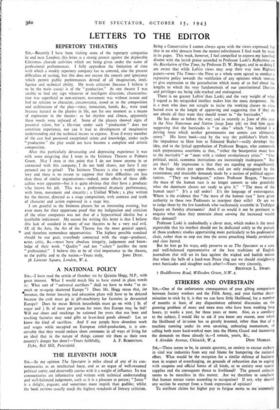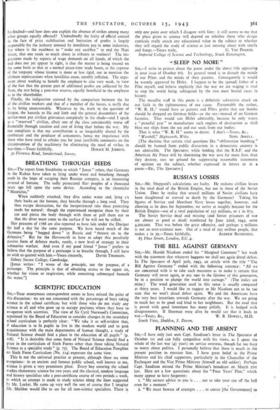Sts,—There seems to be, in certain quarters, an anxiety to
excuse strikers in vital war industries irom any real blame for hampering the national effort. What would be the reception for a similar defence of business men in respect of overcharging, on grounds of exhaustion due to coping with coupons and official forms of all kinds, or to anxiety over scanty supplies and the consequent threat to livelihood? The general attitude seems to be merciless in this matter. Are we therefore to conclude that human nature varies according to occupation? If not, why should any section be exempt from a frank expression of opinion?
To attribute claims for, higher pay to fatigue seems to me -extremely
far-fetched—and how does one explain the absence of strikes among many other groups equally affected? Undoubtedly the laxity of official control in the face of price stabilisation and limitation of profits is largely responsible for the jealousy aroused by inordinate pay in some industries, but where is the readiness to " make any sacrifice to end the Nazi threat, that one reads so much about in tributes to workers? The im- pressions made by reports of wage demands on all hands, of which the end does not yet appear in sight, is that the matter is being treated on the same basis as that in a normal peace-time trade boom, at the expense of the •taxpayer whose income is more or less rigid, not to mention the ultimate repercussions when hostilities cease, notably inflation. The argu- ment about working to benefit the employer eis also very weak, in view of the fact that the greater part of additional profits are collected by the State, the rest being a post-war reserve, equally beneficial to the employee as to the shareholder.
Finally, the indignation aroused by the comparison between the lot of the civilian workers and that of a member of the forces, is really due to its being unanswerable. Whatever be the truth in the question of fatigue, the hazards to life and limb and the general discomforts of the service-man put civilian grievances completely in the shade—and I speak as a "reserved" civilian, albeit one of the class considerably worse off financially through taxation and cost of living than before the war. My one complaint is that my contribution is so inequitably shared by the combatant and the producer of armaments, hence my impatience with those who have tried to rebuke you for your justifiable comments on the circumvention of the machinery for eliminating the need of strikes in



























 Previous page
Previous page